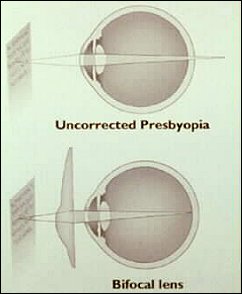A common refractive vision problem which causes blurring is called presbyopia occuring in almost everyone over age forty.
This is the problem of not being able to see up close (e.g. to read) even if the vision is normal at distance with or without distance glasses or contact lenses. As the lens inside the eye becomes older, near objects, for example a book, become harder to see even if distant objects are clear. The lens is not able to focus on objects or print which are close to the eye. At this point, reading glasses become necessary. There are surgical techniques being developed to correct presbyopia.
with or without distance glasses or contact lenses. As the lens inside the eye becomes older, near objects, for example a book, become harder to see even if distant objects are clear. The lens is not able to focus on objects or print which are close to the eye. At this point, reading glasses become necessary. There are surgical techniques being developed to correct presbyopia.
In Dr. Nepple's opinion, there is no reliable or sufficiently safe laser or other surgical technique for the satisfactory correction of presbyopia. However, there are options and compromises which are satisfactory for many presbyopic people over 40 years of age considering laser vision correction.
Monovision for Presbyopia
One option to permit a person over age 40 with the problem of Presbyopia to see well at both distance and near is the technique known as “monovision”
Monovision means one eye is corrected for distance vision and the other eye for near vision. If a person is nearsighted in both eyes, one eye is corrected to see well (if any correction is necessary) at distance and the other eye corrected only enough to see at near. There is some controversy as to which eye, namely the “dominant” or “nondominant”eye “ should be corrected for distance. Vision can be corrected with laser vision correction or if a person needs cataract surgery, the vision can be corrected by adjusting the power of the lens implant inserted at the time of cataract surgery.
Many people do not tolerate monovision. If you are interested in this technique, you should try monovision first either with glasses or contact lenses with one fully corrected eye and one undercorrected eye. If you find monovision to be intolerable using this trial, you may then avoid having the repeat surgery of a lens implant exchange if you had cataract surgery with lens implant, or laser vision correction. Alternatively if the original procedure was laser vision correction you may avoid "enhancement", also called repeat laser vision correction.
For Information about:
CALL TODAY: 262-338-0505 for an appointment!
Or use our online form: REQUEST AN APPOINTMENT




